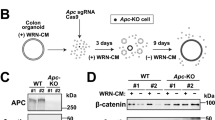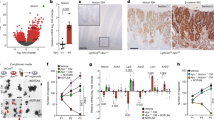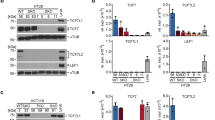Abstract
In this study we sought factors that determine the survival of human colonic epithelial cells. Normal colonic epithelial cells are dependent on cell-cell contacts and survival factors for the inhibition of apoptosis whereas, during colorectal tumorigenesis, cells develop mechanisms to evade these controls. The ability to survive loss of cell-cell contacts and/or growth factor deprivation is a marker of tumour progression. Many adenoma (premaligant) cultures survive only if cell-cell contacts are maintained in vitro and die by apoptosis if trypsinized to single cells. This also occurs in adenomas derived from familial adenomatous polyposis (FAP) patients, therefore APC mutations do not confer resistance to cell death in response to loss of cell-cell contacts. We show here that if cell-cell contacts are maintained such cells are capable of survival in suspension. Adenoma cells also undergo apoptosis in response to removal of serum and growth factors from the medium. After removal of serum and growth factors c-myc is down-regulated within 2 h. Therefore, the induction of apoptosis is not an inappropriate response of the cells due to a deregulated c-myc gene. The apoptotic response is also p53 independent. Such cultures have been used to determine specific survival factors for colonic epithelial cells. Insulin, the insulin-like growth factors I and II, hydrocortisone and epidermal growth factor (EGF) protect cells from the induction of apoptosis in the absence of serum over a short-term period of 24 h. This approach may give insight into the factors governing growth and survival of colonic epithelial cells in vivo. This is the first report of specific growth factors protecting against apoptosis in human colonic epithelial cells.
This is a preview of subscription content, access via your institution
Access options
Subscribe to this journal
Receive 24 print issues and online access
$259.00 per year
only $10.79 per issue
Buy this article
- Purchase on Springer Link
- Instant access to full article PDF
Prices may be subject to local taxes which are calculated during checkout
Similar content being viewed by others
Author information
Authors and Affiliations
Rights and permissions
About this article
Cite this article
Hague, A., Hicks, D., Bracey, T. et al. Cell-cell contact and specific cytokines inhibit apoptosis of colonic epithelial cells: growth factors protect against c-myc-independent apoptosis. Br J Cancer 75, 960–968 (1997). https://doi.org/10.1038/bjc.1997.167
Issue Date:
DOI: https://doi.org/10.1038/bjc.1997.167
This article is cited by
-
Expression and transcriptional regulation of caspase-14 in simple and complex epithelia
Cell Death & Differentiation (2002)
-
Apoptosis-prone phenotype of human colon carcinoma cells with a high level amplification of the c-myc gene
Oncogene (1999)
-
Experimental models of colorectal cancer
Diseases of the Colon & Rectum (1998)



